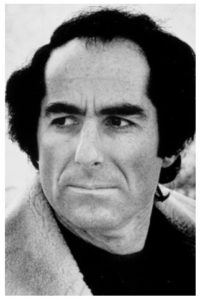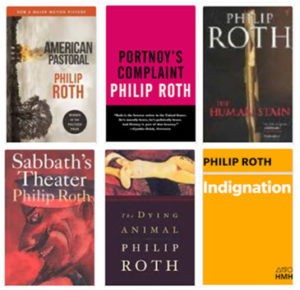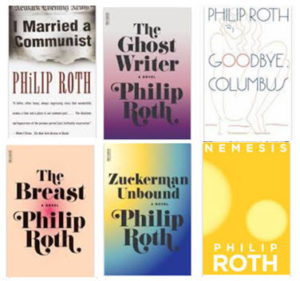On hearing the news of Pulitzer Prize-winning author Philip Roth’s death, I couldn’t help but feel saddened, and extraordinarily grateful for the gift of his many remarkable works.
 If you hadn’t heard, Roth died yesterday at the age of 85, leaving a legacy of lyrical, memorable books written between 1959 and 2010.
If you hadn’t heard, Roth died yesterday at the age of 85, leaving a legacy of lyrical, memorable books written between 1959 and 2010.
In fact, roughly five and a half years ago, I wrote a post about Roth’s retirement, which he took in 2012 at the age of 80. And I would like to share that post again today, as my little contribution to remembering Philip Roth.
* * *
A Meaningful Life
This weekend I indulged in several articles to do with writing and writers, but I would like to mention only one of them, “Goodbye, Frustration: Pen Put Aside, Roth Talks.” I found myself nodding as I read – with recognition and also, regret.
Philip Roth, for those who may not know, has authored books too numerous to list (there have been 31 since 1959), and to my dismay, most I have not read. To speak of him in any referential manner seems ingenuous, if not somewhat foolish, yet here I am.
I readily confess he is not the only author I’ve neglected; there are libraries full of writers I’ve yet to discover – classic and contemporary – and as a result, I feel I ought to receive a strict and swift sentence of banishment.
In case you’re wondering, said exile would involve a desert island or possibly a small garden, a period of no less than one year, a truckload of books (some of my choosing and others by assignment), an IV drip of French or Italian Roast, and… sufficient nourishment to read carefully and joyously.
I am not afraid of solitude or isolation, as long as I possess words.
Missing Words
Words, of course, cannot be possessed, though those of us who write would mortgage our souls to believe otherwise as we chase after our verbs with a butterfly net (failing more often than we succeed), we swing our arms (and bats and Bics) in the general direction of an adequate adjective (missing the slider and the fastball), we surrender to the search for the needling noun in the haystack – some of us awaiting dream to deliver it.
On a good day, we welcome the folly of infatuation. We fawn over a passage, convinced we can leave it to stand on its own. If we’re smart we know otherwise and return as often as necessary until it is, in fact, the case.
For those who read, words are available for long-term lease. We find them steadfast and accessible on worn and familiar pages, if not the latest LCD display or better still, cradled in memory by a once absorbent mind.
My longed-for remedial reading course aside, I have a vague recollection of plunging into Roth’s “Portnoy’s Complaint” at an age when much of its content was over my head. I was barely at the blossoming of sexual awareness, that awareness later illuminated by Henry Miller’s “Tropic of Cancer” and the screen version of Roth’s first book, “Goodbye Columbus.” What I remember most is that the movie version featured a fresh-faced, petulant, and delectable Ali MacGraw.
Stories, Characters, and Impressions
Some works of literature, classic or popular, make their mark through plot. Others offer unforgettable characters, and some, exquisite contortions of language. I tend to be most struck by characters and language; language most of all.
Yet Mr. Roth’s impact on my young life came via the screen version of “Goodbye Columbus.” Like every other 12 or 13-year old girl I knew at the time, I was torn between emulating Peggy Lipton or Ali MacGraw, the former out of the question due to my coloring, and the latter remaining the object of my hopeful entreaties to the fates that somehow, someday, I might be one particle as lovely, as saucy, and as desirable as she.
As for my prepubescent fantasies, when I so much as see or hear Philip Roth’s name, I think of Portnoy and MacGraw, tossed back to the late 1960s and early 70s, to adolescence and genuine innocence, to the impressions of just a few letters ordered and printed on the page: R-O-T-H, or for that matter, S-E-X.
Returning to Philip Roth’s illustrious career and his self-imposed retirement as he approaches 80, the New York Times offers this:
To his friends the notion of Mr. Roth not writing is like Mr. Roth not breathing. It sometimes seemed as if writing were all he did… Well into his 70s, the books, though shorter, came uninterruptedly, practically one a year.
And there is where I nod, not to producing a book a year of course, but to the fact that not writing would be like not breathing – whether we produce any number of books or none at all.
 Mr. Roth is quoted as concerns the peacefulness of his decision to retire. He also refers to these words written to himself: “The struggle with writing is over.” Clearly this is a struggle in which he has prevailed thirty-one times, or more likely, thirty-one thousand.
Mr. Roth is quoted as concerns the peacefulness of his decision to retire. He also refers to these words written to himself: “The struggle with writing is over.” Clearly this is a struggle in which he has prevailed thirty-one times, or more likely, thirty-one thousand.
Frustration, Stamina, Discipline
Mr. Roth also speaks to frustration and stamina. May we agree that the discipline he has exercised throughout his writing career is evident?
What lessons are there in his words, whether we are writers or not?
Many of us know frustration in our lives. Do we honor it by acknowledgment? Do we bloody ourselves beating our fists against it? Do we eventually find our way over, under, around, or through, committed to whatever it takes to rally beyond its borders?
Some of us are blessed with stamina. Do we recognize it, understand it as an asset, and use it to our advantage while we still can?
As for discipline, many no longer consider it a virtue. But isn’t it a must for anyone who wishes to excel, whatever the field? Don’t we all need to conquer frustration, exploit stamina, and dedicate ourselves to discipline if we want to do something well?
Of course, none of this means that we who insist on pursuing our creative passions against all odds achieve our goals – modest or otherwise.
Yet we continue. Stubbornly, we continue.
On Books
Recently, I was enjoying a neighborly visit in my writing community, a fanciful contemplation of the “ideal” bookshelf. While thinking through the authors I would tenderly select as companions for my own necessary collection, I realized that the absence of a bookshelf well filled is unimaginable. Finding volumes to occupy it is hardly the problem. If anything, the dilemma is a shelf long enough to hold what I have read and return to lovingly, and if possible, allowing sufficient space for future discoveries.
To some of us, words present themselves as sensitive and symphonic notes. Words are the music we crave, which isn’t to say we turn our backs on Rachmaninoff or the Rolling Stones, only that if we had to choose there would be no hesitation: Baudelaire over Bon Jovi, Dostoevsky over Debussy, Miller over Mozart, Proulx over Pink Floyd.
 While I might make an exception for one ecstatic Benjamin Britten work (and possibly the Beatles), I would surrender happily to that small island with pen in hand, paper at the ready, and the haul of books awaiting my attention. I would certainly place Mr. Roth’s “American Pastoral” and “The Human Stain” on my Island Exile Reading List.
While I might make an exception for one ecstatic Benjamin Britten work (and possibly the Beatles), I would surrender happily to that small island with pen in hand, paper at the ready, and the haul of books awaiting my attention. I would certainly place Mr. Roth’s “American Pastoral” and “The Human Stain” on my Island Exile Reading List.
Prolific?
Recently, a friend offhandedly referred to me as prolific. She meant it as a compliment, yet it is a term that unnerves me.
Yes, I write daily because it is habit. It is also discipline. I have (not so simply) transferred an activity I engaged in for years from paper and a private format to something equally exploratory but differently structured, more contemporary, more commercial, and more public.
And yes, this writing is considerably more time consuming and no longer “just” daily writing practice. By virtue of being public, whatever is published (albeit draft and conversational) is a record of sorts or perhaps more a stake in the ground to mark a point in time, a mindset, an exercise. This “public” writing is also connective. That connection is an added dimension I fully enjoy.
But that isn’t why I do it, and I don’t care about being prolific. I care about being good.
I will also clarify that I care about producing something worthy, though even now I’m not certain how to define or measure value in this instance. Still, if my own musings are never so meaningful or masterful as those I will read, admire and internalize, if my own stories (if I can call them that) remain unfinished, if I do nothing but pound out thoughts on a keyboard – may I at least feel kinship with the process of tinkering despite frustration, forging ahead thanks to stamina, and defiantly clinging to the struggle of writing, courtesy of discipline in the hope of an eventual arrival at – if not “me” as Ali MacGraw, then me as myself, a good writer.
Work Versus Work Product
As to the insular focus that seems inevitable at moments and the writer’s necessity for living amply enough to mine his or her experience for the word-music-meaning he will shape, I cannot imagine the desolation of finding myself wordless, though I have at moments experienced a near-wordless state and it is abandonment of the most bitter and terrifying sort.
Are any of my words meaningful?
That’s hard for me to say; writing and loving have been the two aspects of my life that matter. Both seem more experiential than result-driven, though there’s room for debate on that pronouncement. So, I will conclude that my words are meaningful as a record of insights and events, at least to me.
Are any of my words memorable?
On that score I would say no, but some – written elsewhere – I find to be good. When I consider the words good, it is because process and result are harmonious, and that realization is music to my ears.
Circling back to Mr. Roth’s retirement, I wonder what it would be like to reach 80 years of age with a 31-book legacy. Then again, what about a life in which there is no particular legacy to show for years spent pounding away on a Smith Corona or a Selectric or a Dell, largely because that tapping, too, is its own sweet voice?
If there is regret, and I did say I was nodding throughout the Times article not only with recognition but with regret, then it is personal and not about Roth whatsoever. It is regret for the words I have never succeeded in corralling into cohesive, useful, meaningful and musical measures. It is for the words I have yet to read, a situation that is more likely to be redressed.
 And yet, there is regret nonetheless for the very act Philip Roth is undertaking, however content he is with his decision. What must it be like to put down the pen as he has done, knowing you have accomplished all that he has? What must it be to pursue the pure pleasure of reading, which he also does – nightly, and with relish?
And yet, there is regret nonetheless for the very act Philip Roth is undertaking, however content he is with his decision. What must it be like to put down the pen as he has done, knowing you have accomplished all that he has? What must it be to pursue the pure pleasure of reading, which he also does – nightly, and with relish?
How lovely an exile it would be – that island, wherever it is found – devoted to the bounty of meaningful and memorable words.
Image of Philip Roth, 1973, Public Domain, via Wiki
You May Also Enjoy
This is interesting. I read one of his books, I think it was “Portnoy’s Complaint,” long, long ago, because it was the thing to do. And I hated it. Maybe, like you, I was too young. I found it pompous, navel-gazing, demeaning to women. I could see why critics (men) would cackle over it with joy, and that turned me off further. Maybe I should try again. But there are so many books, so little time. I know I can’t read even a book a week, and there are only 52 weeks in a year. Is Roth in my top 50? Nope, not by a mile.
Prolific is another term for “doesn’t waste time.”
His early books certainly do reflect the machismo of the time, I agree. The pop culture of the time, really, and a certain milieu. I would be curious as to what you think of The Human Stain.
I, too, disliked Roth’s works, at least those I abandoned, never to read another. But I do have an anecdote to share. Roth was a Newark, New Jersey guy; good friends with the English Department Chairman of the high school where I taught. I had been working on using descriptive adjectives with my classes, and the department chairman thought asking Roth to speak to my students on the subject.would be a valuable addition to my lessons. We met for coffee before my first class, during which he outlined his presentation. Upon entering the classroom, we were both struck by the sentence written on the back blackboard: “Mrs. Muller is a blue pants wearing bitch.” Roth turned to me and said, “It appears you’ve been very successful!”
Too funny, Angela!
Angela,
Now that certainly is a “remembering” that you would never forget!
D.A.,
I will admit that I have never heard of Philip Roth until I read your post. Nor do I care to use my time reading his work. For me, it is not the quantity of books written in a life time, nor the number of words one is capable of disturbing in any form that becomes meaningful or memorable, by it is my reliability to the word or words.
Please know that your organization of words, impeccable grammar, have meanings to me. And as I remember silly conversations and connections with people outside of my tiny circle about topics of purple food to blue jello, your words must have memorable moments. And your ability to allow space for others to share deep hard challenges, so heart wrenching because we too share similar challenges and assist us so we do not feel so alone in our thoughts and emotions.
I’m truly enjoying “slightly south of simple” by Kristy Woodson Harvey. I have visited this island where I live for over a century and choose to live in a tiny patio home on the island for almost a decade, so I do relate to the characters and can vision so much in full color that I’m in love with every word she writes. So relatable for me!
Thank you for all your words!
So glad you are enjoying Kristy’s book, TD! And thank you for your kind words. ?